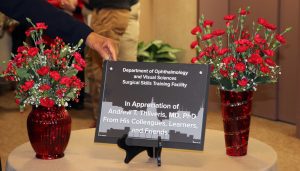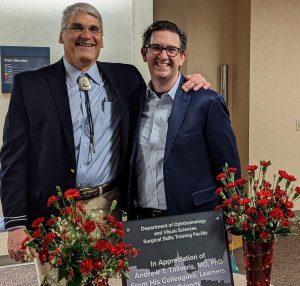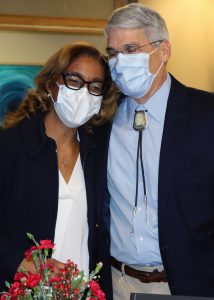Department of Ophthalmology and Visual Sciences faculty, staff, alumni, and benefactors gathered in the garden level of the UW Health University Station Clinic April 7 for the official unveiling of a new state-of-the-art Surgical Skills Training Facility (SSTF).
The new facility addresses an urgent need for additional flexible space with the capacity to accommodate a variety of learning purposes, programs, and initiatives. It significantly increases training capacity – from a converted closet at the William S. Middleton Veterans Administration Hospital that could only accommodate two people – to an expanded space that can now accommodate 10 learners at one time, along with state-of-the art equipment that mimics what is in the operating room.
“This expanded space allows for a more realistic hands-on experience, preparing our learners for the situations they will encounter in surgery,” said Terri L. Young, MD, MBA, department chair. “We believe that the foundation of surgical training occurs in the surgical training wet lab, where learners gain skills, familiarity, and confidence in the steps of ophthalmic surgery prior to caring for patients in the operating room. The new facility also provides ease of access and new opportunities for learning before, after or between clinic time as well as on weekends.”
The lab consists of 10 variable-height wet lab workstations. Each one is outfitted with cutting-edge equipment, including a microscope with flexible arm tabletop stand; a camera; video capability; and a halogen light source, controls, and foot switch. In addition, there is a high-resolution screen/monitor connected to the wet lab space allowing for group viewing and discussion.
“One of the biggest benefits to the new space is that it enables us to expand our teaching capabilities to a broader audience of learners and ophthalmic professionals,” Young said. “This includes alumni, technical staff, and community providers – all of whom will be able to practice and advance their skills in a positive learning environment.”
The space officially recognizes Andrew Thliveris, vice chair or resident education and Veterans Affairs Hospital service chief, for his outstanding contributions to the department.
“It’s mind-blowing!,” Dr. Thliveris said. “The opening of this space marks a new chapter in residency education and is a crucial component in training the next generation of eye care providers. It’s a huge accomplishment for our department – to our alumni and residents too. I believe this is the way we give back. We can truly be generational with our training, and we couldn’t have achieved it without the overwhelming support of the DOVS community.”
More than $100,000 in funds were raised by the department community in support of the facility.


